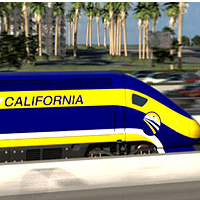State Sues Everybody to Prevent High-Speed Rail Legal Actions

With opposition to California’s proposed high-speed rail line between Los Angeles and San Francisco growing more vocal by the day, the state has taken steps to minimize lawsuits by, in effect, preemptively filing a lawsuit against everyone on the planet.
The San Jose Mercury News reported Thursday that the state Attorney General’s office, on behalf of the California High-Speed Rail Authority, will utilize a legal maneuver only available to the government that allows for the consolidation of future lawsuits against the state by inviting interested parties to join one big one now.
While the “summons” to consolidate future cases is part of relatively arcane civil code, it has been used by government entities to smooth the way for large public projects. San Jose used it in 2009 before issuing bonds for construction of its convention center.
The state wants to be able to assure markets that when it seeks to sell $8.6 billion in bonds authorized by voters in 2008, there won’t be legal challenges gumming up the works. Lawsuits challenging the project on environmental grounds would not be affected.
High-Speed Rail Authority v. All Persons Interested, which could take years to work its way through the courts, was filed in Sacramento County Superior Court and can be joined by anyone. Details on how to sign up will be published in major newspapers across the state over a three-week period.
If all goes as planned, and projects this size rarely do, trains will speed along at up to 220 miles per hour between Los Angeles and San Francisco in two hours and 40 minutes with stops at 24 stations along the way. Contractor bids were received last month for construction of the first 30 miles of track, between Madera and Bakersfield.
Californians—skittish about project delays, the rotten economy, debates over the route, and the $68 billion price tag—seem to want high-speed rail but not at this cost. Only 43% of respondents in a poll this month by the Public Policy Institute of California were in favor of the project, numbers that are nearly identical to a year ago (when the price tag was $100 million). But 55% said they would approve of the project if the costs were lower, and 59% saw high-speed rail as economically important to the state’s “quality of life and economic vitality.”
So far, the project gets a mixed-review from the U.S. Government Accountability Office. A report last December said that “cost estimates are comprehensive in that they include major components of construction and operating costs,” but “in some cases GAO was unable to trace the final cost estimate back to its source documentation and could not verify how certain cost components, such as stations and trains, were calculated.”
Despite the steady poll numbers, opposition has been more evident of late. CNN aired a much-publicized report by Drew Griffin on Tuesday that characterized high-speed rail in California as a “boondoggle.” It echoed complaints raised in another high-profile CNN beatdown by Anderson Cooper last year. MediaMatters found the CNN reports consistently misleading because, among other things, they ignore Republican obstructionism, especially at the federal level, to slowing the project to a crawl.
Quentin Kopp, a former judge who co-wrote legislation launching the project when he was in the state Senate, recently went on record as having flipped his position. The Los Angeles Times quotes him as saying, “They have just mangled this project. They distorted it. We don't get a high-speed rail system. It is the great train robbery.” He said voters approved the project with the understanding that each segment would be pre-financed and constructed in “usable segments.” He said that is not happening.
–Ken Broder
To Learn More:
California's High-Speed Rail Authority Sues Everybody, Invites You to Argue Case in Court (by Mike Rosenberg, San Jose Mercury News)
State Sues Everyone in High-Speed Rail Case (by Daniel Blackburn, CalCoast News)
High-Speed Rail’s Strongest Backers Now Express Reservations (by Ralph Vartabedian, Los Angeles Times)
What CNN Is Missing about High-Speed Rail (by Jill Fitzsimmons, MediaMatters)
Preliminary Assessment of California's Cost Estimates and Other Challenges (U.S. Government Accountability Office)
Federal Transportation Funding May be Running Out of Gas (by Noel Brinkerhoff and Danny Biederman, AllGov)
- Top Stories
- Controversies
- Where is the Money Going?
- California and the Nation
- Appointments and Resignations
- Unusual News
- Latest News
- California Forbids U.S. Immigration Agents from Pretending to be Police
- California Lawmakers Urged to Strip “Self-Dealing” Tax Board of Its Duties
- Big Oil’s Grip on California
- Santa Cruz Police See Homeland Security Betrayal in Use of Gang Roundup as Cover for Immigration Raid
- Oil Companies Face Deadline to Stop Polluting California Groundwater





